Image Credit: Edwin Remsberg and Cindy Nelson
Here in the College of Agriculture and Natural Resources, we are proud to join Governor Larry Hogan in celebrating 2020 as the Year of the Woman in the state of Maryland. This commemoration aligns with the 100th anniversary of the ratification of the 19th amendment, which gave women the right to vote. March 1st also marks the beginning of Women’s History Month, a time for honoring and recognizing the profound impacts that women have had across the state and nation.
This month, the college will pay tribute to six of our women faculty and staff who are making exceptional strides in research, education, Extension outreach, and administration. Each leader also serves as an outstanding mentor and ambassador for the college with a commitment to enhance the lives and livelihoods of those around them.
Glori Hyman, director of the college’s Institute for Applied Agriculture
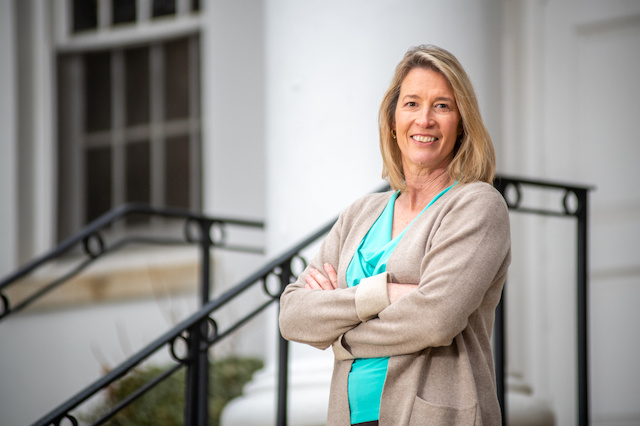
Glori has been with the college for close to 30 years, rising in the ranks from faculty to director of the IAA. Glori shines brightly in the college with her rich sense of humor, and inspires passion across the college with her creativity and innovation. In her day-to-day duties, she helps students launch and advance their careers in agriculture and natural resources, which in turn produces well-educated, qualified employees and entrepreneurs who boost Maryland’s economy. Over 60% of IAA graduates stay and work in Maryland, and many of them become productive leaders in Maryland agriculture.
“I believe mentorship and leadership are important regardless of your gender, title, or position, and that we all have a responsibility to be a role model for students and colleagues,” says Hyman. “For me, I hope that by showing up publicly on stage at AGNR events and having a voice on the college’s strategic initiative leadership team, I inspire other professional track faculty. I hope that I set an example that encourages them and gives them the confidence to raise their hands and become leaders in our college. In addition, I try to spread joy and positivity. It's okay to have fun at work.”
Carol Keefer, professor in the Department of Animal and Avian Sciences
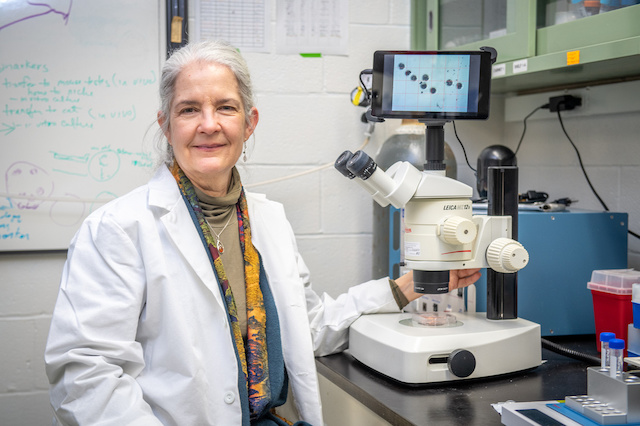
Carol has a fascinating professional background, one that did not originate in higher education. Prior to joining the faculty in AGNR, she worked in the biotech industry making transgenic goats to produce spider silk, a core substance for making bullet proof materials, and cloning high value dairy cows. She takes great pride in teaching and spreading the joy of discovering how biological mechanisms work. She believes that mentorship is one of the most important contributions she can make, which helps students determine their ultimate career direction.
Carol was the AGNR UMD Advance Professor from 2016-2019, a program that works to support the recruitment, retention, advancement, and professional growth of women and under-represented minority faculty at the University of Maryland.
“During that time I held workshops and met individually with women faculty to help them navigate the promotion and tenure process in AGNR,” says Keefer. “The process can be intimidating, so I, along with other senior women faculty, worked to provide a non-threatening source of encouragement and help with their promotion and tenure packages. This would include discussing more strategic ways to highlight their own accomplishments, something we are often not trained to do.”
Nia Imani Fields, assistant director and state 4-H program leader, University of Maryland Extension
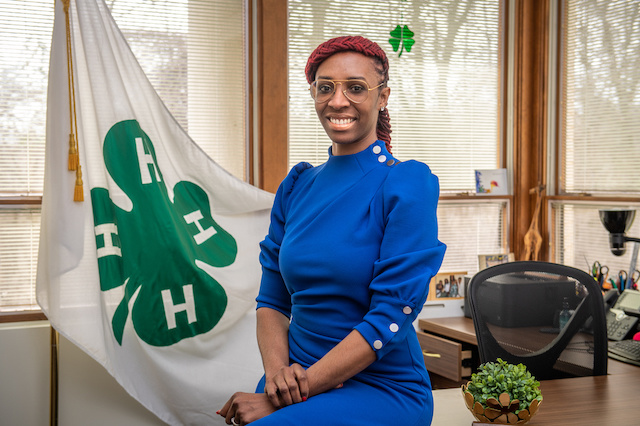
As the leader of Maryland’s 4-H program and with 14 years of AGNR experience, Nia intimately understands how to strengthen the youth educational experience through exposure to programs, forums, classes, and opportunities here on UMD’s campus and throughout the state. She often mentions that “4-H is the first course of our land-grant educational system across the country.” She finds joy in knowing that she plays a role in helping youth explore their passion and harness their skills, leading to well-rounded individuals who are successful in school, the workforce, and their communities.
Nia is currently an AGNR UMD Advance professor, where she represents Extension and works to increase networks and provide support around career advancement, develop research and scholarship opportunities, and sustain work/life balance, among other things.
“We've held sessions across the state based on feedback from our women faculty,” says Fields. “I am where I am today because of those who supported me throughout my career. I value the importance of representation and mentorship and am honored to serve in this role for UMD Extension.”
Kate Everts, professor and director of the Wye Research and Education Center (WyeRec) and the Harry Hughes Center for AgroEcology
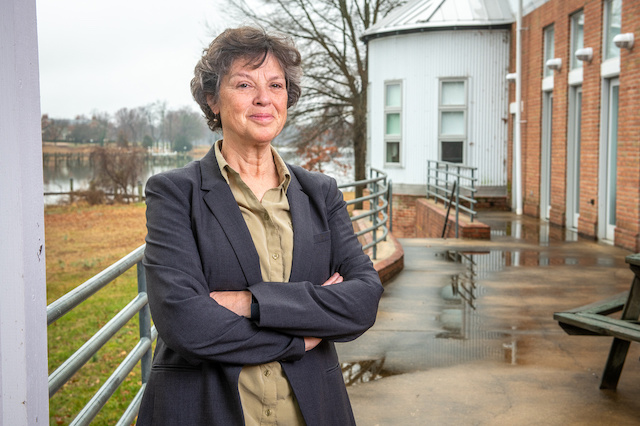
A 24 year veteran of the college, Kate’s work has focused on developing sustainable management practices for vegetable diseases. Her lab has developed several new management techniques, including a discovery that cover crops could suppress soilborne disease on watermelons. She has forged close relationships with Maryland farmers, and believes that Maryland agricultural businesses must farm and forest in ways that are resilient in the face of economic, regulatory, and environmental challenges unique to our geographic location. The WyeRec and the Hughes Center have helped farmers connect environmentally sound and profitable agriculture practices while becoming some of the most progressive farmers in the nation. Kate will lead these efforts into the future.
“I believe that pursuing diversity goes hand-in-hand with pursuing excellence, and that the effort to achieve and maintain faculty, staff, and student diversity must be intentional,” says Everts. “Diverse working groups are more innovative, make better decisions, and reach superior outcomes than less diverse groups. Leaders that appreciate diversity and build consensus with faculty around challenges to inclusion can expand diversity and improve retention among faculty, staff, and students.”
Traci Jackson, assistant director, human resources in the Department of Environmental Science and Technology
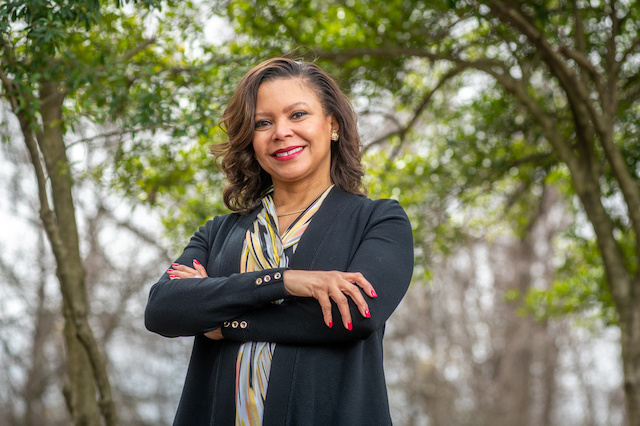
Traci is a devoted Terp as a seven-year employee and graduate of the Robert H. Smith School of Business. She finds passion in her work by helping others, whether helping to resolve a complex or even simple issue, or working with students to explain processes and provide resources that help them better navigate the intricacies of campus life. She is on the front lines of search, recruitment, and onboarding for top faculty and staff, and is recognized by her colleagues for her exceptional integrity, which helps maintain the trust and reputation that audiences have of AGNR and the university at large.
“Both from afar as well as up close and personal, female mentorship, leadership, and guidance in the academic workplace have been key to my professional advancement over the years,” says Jackson. “Being able to see women break through barriers and learn from their challenges and triumphs has helped to shape my professional outlook. As a leader, I encourage women (and men) around me, whether I supervise them or simply interact with them, to be deliberate about their professional development and to work towards accomplishing their goals sooner rather than later. Carpe diem!”
Virginia (Ginny) Rosenkranz, principal agent associate, University of Maryland Extension
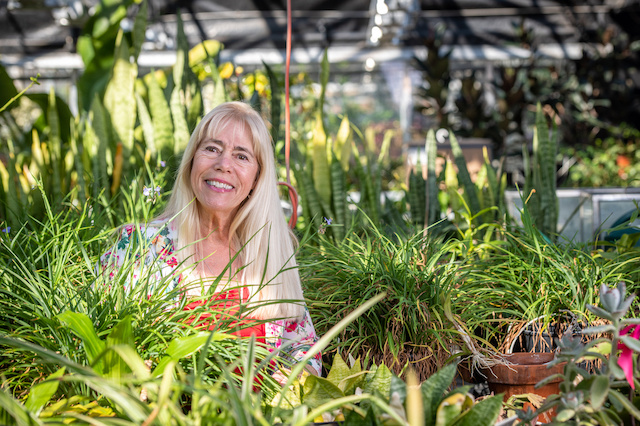
Ginny has been with Extension for 26 years and is regarded as one of the state’s leading commercial horticulture specialists with an emphasis on integrated pest management, total plant management, and Master Gardener coordination for her tri-county area. She is one of the most public facing faculty members within the college with robust teaching programs, an on-line newsletter, a monthly 30-minute video, and DelmarvaLife, a monthly segment on her local CBS affiliate station. She consistently finds that when she meets people in her three counties, they know who she is and trust her to help them solve their plant problems. She loves sharing her knowledge with others and inspiring them to learn about and enjoy plants.
“Women are wonderful mentors and leaders who excel in providing guidance in any workplace, including the academic workplace,” says Rosenkranz. “Over the years, I have been an unofficial mentor to many of the brilliant women who are Extension agents in Maryland’s 23 counties and Baltimore City. It has been a real pleasure to watch them thrive and excel in their careers. I have also become an official mentor to a new faculty member, and we both enjoy the times we sit down to discuss what she has already accomplished and what else she could strive for.”